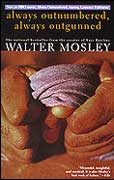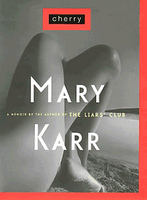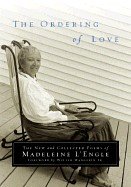I know that Walter Mosely is a bestselling author, but even more people should read him than they do. Most people I know haven't, and I'm not sure why. He has written the fine series of mysteries around the character Easy Rawlins and some well received science fiction books and one adolescent novel (which I hope to read in the near future). He also has a series of books about the world wise ex-con Socrates Fortlow. I had read the second in this series, Walkin' The Dog, some time ago. Recently, I read the first, Always Outnumbered, Always Outgunned. (Click the title to read an excerpt.)
 The book is a series of linked short stories where readers watch Socrates wrestling with getting enough money to get by and with the moral and ethical questions faced by a black man and by the society he lives in. In the first story, "Crimson Shadow," he catches a young boy who has killed a neighbor's rooster. How Socrates handles this situation and tries to take care of this boy is not only touching, but speaks to the responsibility we all have to children and families in our neighborhoods. Mosely deftly walks us through Socrates' attempts to get a good, steady job in "Double Standard." We also see the role that guilt plays in a person's life and a hunger for redemption, not only Socrates' but that of the young man he wants to save, is a significant theme of the book.
The book is a series of linked short stories where readers watch Socrates wrestling with getting enough money to get by and with the moral and ethical questions faced by a black man and by the society he lives in. In the first story, "Crimson Shadow," he catches a young boy who has killed a neighbor's rooster. How Socrates handles this situation and tries to take care of this boy is not only touching, but speaks to the responsibility we all have to children and families in our neighborhoods. Mosely deftly walks us through Socrates' attempts to get a good, steady job in "Double Standard." We also see the role that guilt plays in a person's life and a hunger for redemption, not only Socrates' but that of the young man he wants to save, is a significant theme of the book.The stories weave together nicely forming a novel that can easily be read at once or a little at a time. Mosely's well crafted narratives are thoughtful and real. Without sentimentality, this is a book of much needed hope.
Cherry is, I suppose, Mary Karr's sequel to The Liar's Club (click here for my post on this book). Where the first memoir focused on Karr's early childhood, Cherry concerns the years of middle school and high school. The book opens with a chapter about Karr leaving home, but the rest of the story is about the events which lead up to this moment. The book jacket describes the book as the "story of her tumultuous teens and sexual coming of age." I don't know about "coming of age," but sex is one of the main things this book revolves around. That and drugs and the usual problems of fitting in with people in a place one is not sure one wants to fit in.

I like many things about Cherry. I particularly like that Karr tells her story in her own powerful, honest way neither glorifying the era of "sex, drugs and rock and roll" (not that this time is any different) nor telling her readers "don't let this happen to you." Few writers focus on this time in one's life with such emotional honesty without going overboard in either direction. The story is what it is, and is powerful enough on its own. I also found myself strongly relating to her and her friends who read a lot and want more out of life than just the next dance. Further the book is funny where it needs to be and serious (without being maudlin) where necessary. I was particularly drawn in when I read passages where Karr tells of her own shortcomings as a friend.
A couple things bothered be about the book. I suspect that Karr's frequent shifts from first person to second person (speaking of herself with the pronoun "you") were meant either to create a kind of emotional distance from from whatever situation she was describing or to create a connection with the reader (a kind of you've been there too feeling). Karr is too smart a writer for gimmicks, but I found this a little distracting. I'm not sure everyone will feel this way, however. I was also a bit uncomfortable with the frank (though not graphic or pornographic) discussions of her sexual, really sensual, feelings. This is not a criticism of the book. These were not titillating or even unnecessary sections. I'm sure my discomfort largely comes from being a male and that I'm not used to such reading, particularly about women. Read the book, but be forewarned.
Madeline L'Engle's collected poems, The Ordering of Love, got better as I moved through it. Some of the pieces are really no stronger, well-meaning as they are, than greeting card verse that if you get you find nice because someone thought to put the words together and someone else thought well enough of you to send them. Some of these pieces would make terrific hymns. These poems will, undoubtedly, be inspirational to some. I even found myself edified by them. But many were not really good art.
 Fortunately, not all of the poems in this collection are mediocre and banal. I got the sense that L'Engle, a writer of considerable skill and craft, learned more with each collection how to write not just a poem that expresses, but one that actually says something in thoughtful and cleaver ways. She is best in two areas: the sonnet and the monologue. The voice in most of the monologues are biblical characters. One sees encounters with God from a position that removes the distance created by time and the dry page.
Fortunately, not all of the poems in this collection are mediocre and banal. I got the sense that L'Engle, a writer of considerable skill and craft, learned more with each collection how to write not just a poem that expresses, but one that actually says something in thoughtful and cleaver ways. She is best in two areas: the sonnet and the monologue. The voice in most of the monologues are biblical characters. One sees encounters with God from a position that removes the distance created by time and the dry page.Somewhere (I can't remember where) L'Engle wrote about the creativity that occurs in the tight form of the sonnet. Those in this collection do not disappoint. While I usually have a preference between traditional and free verse, L'Engle is much better in the stricter forms. In particular, the sequence written in 1966 (collected here for the first time) that addresses the death of her husband is striking in that while it is deeply personal, it plucks the common chords we hear in our hearts when grieving without resorting to cliche or the usual trite platitudes about God in his Heaven and all is right with the world. At times, she questions or rails at God, not with the voice of one losing faith, but of one who, like many pilgrims, has been faithful but has yet to see the fruits of their spiritual labor. These and other sonnets by L'Engle are rich, accessible, and thought provoking.
I've got three issues of Poetry, two books by Walter Mosely, and Karr's Viper's Rum to read and comment on. But that will have to be for next time. Until then, peace.









No comments:
Post a Comment